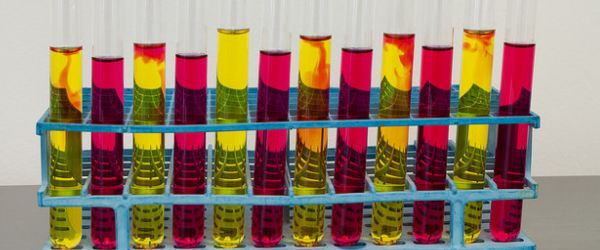You can really tell when Honours Project students start working in the lab on their projects: the pH meter probe is suddenly floating in water and the weighing area is a mess, because nobody had time to explain “the weighing etiquette”. Fret no more! We will spell it out and you can print it out and pin it next to the balance and next to angry “Clean up after yourself. Yes, this means YOU!” signs with the inevitable Lord Kitchener picture.
Before you start
1) Now it’s time to get to grips with concentrations. Grams per liter is not equal to mol per liter. The weight of crystallohydrate includes H2O, which should be subtracted from the compound weight (e.g. the 5H2O in CuSO4·5H2O).
2) Do your calculations before you start to weigh out any chemicals at the bench. This will prevent contamination of your calculator with various chemicals.
3) Wear gloves and a lab coat; even if you don’t care about your safety, you can contaminate the chemical stocks otherwise.
Enjoying this article? Get hard-won lab wisdom like this delivered to your inbox 3x a week.

Join over 65,000 fellow researchers saving time, reducing stress, and seeing their experiments succeed. Unsubscribe anytime.
Next issue goes out tomorrow; don’t miss it.
4) When taking a compound from the fridge/freezer to weigh, let it equilibrate to room temperature, otherwise ice crystals will contribute to the weight you are measuring.
5) Choose an appropriate balance for the amount you are weighing. Weights up to a gram should be measured on analytical balances. Do not weigh a kilogram if your balance says “2 – 200g” as the weight measured will be inaccurate.
The process
7) Always use weighing boats (WB) to weigh chemicals and reagents. Do
not use a beaker; they are too heavy for a good balance.
8) If possible, do not use spatulas to transfer reagents from storage bottles to WBs; you don’t know how clean they are. Gently tap the storage bottle to release the reagent onto a second WB if necessary and transfer from the second WB to the first WB already resting on the balance. Dispose of WBs immediately after use.
9) When making stock solutions use one WB per chemical; trace amounts of each chemical may remain and contribute to the weight of the next, possibly contributing a significant amount to the final ingredient of the solution.
10) Transfer your compound into a beaker that has some H2O in it, add a magnetic flea and place on the magnetic stirrer, as required. Don’t transfer your chemicals directly into a bottle; you can spill them trying to get them through the narrow bottle neck.
11) After transferring your compound to the beaker, by rolling the WB inwards, make sure that nothing has been left behind; some chemicals are sticky and you will have some stuck to your WB. In this case rince your WB with H2O and combine it with your solution.
12) If you take too much chemical from the storage bottle NEVER put the excess back. This will contaminate the stock.
13) If spillage has occurred, clean up the balance. Do not blow on the balance; clean it up with a tissue or a small brush. Using a fresh WB, weigh your chemical again.
Analytical balances
14) If using an analytical balance, you must make sure it is level before starting and close all the doors when weighing your chemicals: they really are that sensitive and will be affected by air conditioning or someone passing by.
15) If you are weighing less than 500mg, do not dispense it directly onto the balance itself; put your chemical onto a small WB or special paper or foil (which you have pre-weighed) and then transfer to the balance.
Before you leave
16) Clean up after you; otherwise it’s unsafe (no-one knows what you’ve left behind).
17) Ensure all reagent bottles are securely sealed; some chemicals and reagents are hygroscopic. Replace all bottles where you found them, not randomly.
If you follow these anti-sin instructions you will not kick your future self, not to mention other lab members, in the leg.
You made it to the end—nice work! If you’re the kind of scientist who likes figuring things out without wasting half a day on trial and error, you’ll love our newsletter. Get 3 quick reads a week, packed with hard-won lab wisdom. Join FREE here.







